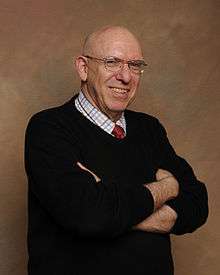Gabriel P. Weisberg
Gabriel P. Weisberg is an American art historian.
| Gabriel P. Weisberg | |
|---|---|
 | |
| Born |
Gabriel Paul Weisberg May 4, 1942 New York City, New York, U.S. |
| Residence | Minneapolis, Minnesota, U.S. |
| Alma mater | Johns Hopkins University |
| Occupation | Professor of Art History University of Minnesota, MN |
| Years active | 1985–present |
| Board member of | Association of Historians of Nineteenth-Century Art |
| Spouse(s) | Yvonne Weisberg (m. 1967) |
Career
He is a professor of Nineteenth-Century Art and Decorative and Graphic Arts[1] at the University of Minnesota. Professor Weisberg graduated from New York University[2] in 1963 with a BA and continued his art history education at the Johns Hopkins University,[2] where he was first mentored by Medievalist Adolf Katzenellenbogen (1901-1964) and then by Christopher Gray (b.1915) who specialized in 19th century art. Weisberg's doctoral dissertation was on the 19th century art critic Philippe Burty (1830-1890), a chief proponent of Japonisme in France. In 1978 Editions Geoffroy-Dechaume published Weisberg's critical analysis on the life and work of the 19th century French Realist master Francois Bonvin. Professor Weisberg was a past president of the Association of Historians of Nineteenth-Century Art.[3] In 2004 Professor Weisberg, along with Edwin Becker of the Van Gogh Museum and Evelyne Possémé of the Musée des Arts Décoratifs, compiled the exhibition "L'Art Nouveau: The Bing Empire"[4] which took place at the Van Gogh Museum in Amsterdam.
In 2008 the festschrift "Twenty-First-Century Perspectives on Nineteenth-Century Art: Essays in Honor of Gabriel P. Weisberg"[5] was published by the University of Delaware Press. Included are a series of 30 essays from noted art historians celebrating Professor Weisberg's long and successful career; contributors include: Petra ten-Doesschate Chu (professor of art history at Seton Hall University), Laurinda S. Dixon (professor of art history at Syracuse University), Geneviève Lacambre (curator emeritus at the Musee d'Orsay, Paris), Annette Leduc Beaulieu (director of the Edouard Vuillard Catalogue Raisonné project) and John Zukowsky (chief curator at the Intrepid Sea, Air & Space Museum).
From December 2008 through April 2009 the Minneapolis Institute of Art exhibited approximately fifty 19th and early 20th century Realist and Naturalist drawings and watercolors from the Weisberg collection in "Expanding the Boundaries: Selected Drawings from the Yvonne and Gabriel P. Weisberg Collection".[6] Today, Professor Weisberg is considered one of the leading authorities on 19th century French Realist and Naturalist art.[7] Since 1967 he has authored over 50 Scopus and Journal publications, 8 books and 21 book chapters[8] on the subject. In addition, he is considered a leading authority on Siegfried Bing (1838-1905), the German art dealer who lived in France and is credited with helping to introduce Japanese art to the West.
In 2015 The University of Minnesota Foundation and the Department of Art History established an endowed Fellowship for use by undergraduates and graduate students working on projects with area museums. It is named in the honor of Professor Gabriel Weisberg.
Honors & Awards
- 2012 Distinguished Teaching of Art History Award from the College Art Association.[9]
- Regents Professor, National Museum of American Art, Smithsonian Institution, Washington, D.C.[1]
- Senior Fellowship at CASVA (National Gallery of Art, Washington, D.C.).[1]
- 2010 Van Gogh Museum and the University of Amsterdam, Visiting Fellow.[10]
- Reviews Editor for AHNCA’s on-line peer reviewed journal Association of Historians of Nineteenth-Century Art.
- Member of the Institute for Advanced Study (Princeton).[1]
- 1982 Guggenheim Fellowship.[11]
- 1980 Named Chairman of the CAA Committee on the Preservation of Art.[12]
- 1979 Nominated for the College Art Association of America's (CCA) Board of Directors.[13]
Publications
- Illusions of Reality: Naturalist Painting, Photography and Cinema, 1875-1918. Weisberg, Gabriel (author, editor), Edwin Becker, David Jackson, Willa Silverman, Mercatorfonds/Van Gogh Museum, 2011.
- Montmartre and the Making of Mass Culture (editor). Weisberg, Gabriel, Rutgers University Press, 2001.
- Overcoming All Obstacles: The Women of the Academie Julian. Weisberg, Gabriel, New Brunswick, Rutgers University Press, 1999.
- Art Nouveau, A Research Guide for Design Reform in France, Belgium, England and the United States. Weisberg, Gabriel, Garland Publishing, Inc., 1998.
- Redefining genre: French and American painting 1850-1900, Weisberg, Gabriel P., Petra ten-Doesschate Chu, Dixon Gallery and Gardens, Trust for Museum Exhibitions, 1995.
- The Popularization of Images: Visual Culture Under the July Monarchy (co-editor). Weisberg, Gabriel, Princeton University Press, 1994.
- The Independent Critic: Philippe Burty and the Visual Arts of Mid-Nineteenth Century France,Weisberg, Gabriel, Peter Lang International Academic Publishers, 1993.
- Art Nouveau Bing: Paris style 1900, Weisberg, Gabriel P., Smithsonian Institution. Traveling Exhibition Service, New York, Harry N. Abrams, 1986.
- Beyond Impressionism: The Naturalist Impulse. Weisberg, Gabriel, New York, Harry N. Abrams, 1986.
- The Drawings and Water Colors of Léon Bonvin, Weisberg, Gabriel, Ohio, The Cleveland Museum of Art, 1980
- The Realist Tradition - French Painting and Drawing 1830-1900, Ohio, The Cleveland Museum of Art, 1980.
- Les Maitres du XIX Siecle: Bonvin, Weisberg, Gabriel, Paris, Editions Geoffroy-Dechaume, 1979.
- The Paintings of François Bonvin in the Wadsworth Atheneum, Weisberg, Gabriel, Wadsworth Atheneum, 1970.
References
- 1 2 3 4 University of Minnesota
- 1 2 Fields of Vision, March 27, 2014
- ↑ Association of Historians of Nineteenth-Century Art
- ↑ Van Gogh Museum
- ↑ World Cat
- ↑ Minneapolis Institute of Art
- ↑ The Oscholars
- ↑ Weisberg Publications
- ↑ College Art Association
- ↑ Van Gogh Museum Visiting Fellow
- ↑ List of Guggenheim Fellowships awarded in 1982 Guggenheim Fellowship 1982
- ↑ College Art Association of American, page 14
- ↑ College Art Association of American, page 3